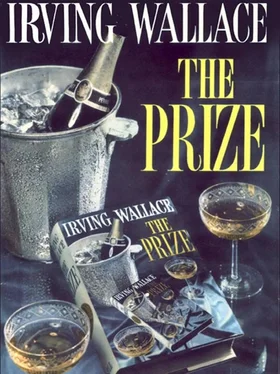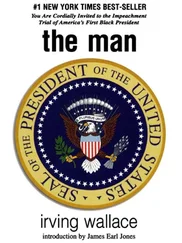‘Thank you,’ said Daranyi modestly. ‘How many subjects will I research?’
Krantz dug inside his jacket pocket and brought out two envelopes. One he placed on the end table. ‘The photographs,’ he said. He opened the second, longer envelope and took out and unfolded what appeared to be half a dozen closely typed pages. He leafed through the pages. ‘Six laureates,’ he said finally, ‘and two wives, one sister-in-law, one niece. Perhaps, because of time limitations, all should not be given equal emphasis.’
For half a minute Krantz was lost in thought. Eckart had suggested the red herring: because you can trust no one in these affairs, do not give the impression you want only one laureate, Max Stratman, investigated, but make it appear you wish all six laureates investigated, Stratman being only one more among them. This was safe, Krantz realized, but the fallacy was that it spread Daranyi’s investigation too thin. They would obtain a little about everyone, and possibly too little about Stratman. Krantz weighed the risk of emphasizing several names, instead of all, and then he took the risk.
‘I will tell you what,’ Krantz resumed. ‘I want to make your inquiry easier. Here, we have ten persons to be looked into, but because of what we already know, perhaps more attention should be given four of them. In your place, I would expend maximum effort on-let us say-Dr. John Garrett and Dr. Carlo Farelli, the laureates in medicine-their wives are of lesser moment, although one never knows-on those two gentlemen, and-let us say-Professor Max Stratman, also-Professor Stratman and his niece, whose name is Emily Stratman. You will keep this in mind, Daranyi?’
‘My memory is unfailing.’
‘Yes, Garrett, Farelli, the Stratmans.’ He examined the papers in his hand. ‘As for the others-the Marceaus-Andrew Craig-’
Daranyi’s bland face almost gave away its first surprise. ‘Andrew Craig?’ he echoed.
Krantz looked up. ‘The literary laureate,’ he said. ‘You know him?’
Daranyi’s mind had gone back to the tall, gaunt American in Lilly Hedqvist’s bed, to their breakfast, to his monologue on sex life in Sweden with Craig in the restaurant. There could not be two Andrew Craigs, both writers, in Stockholm in one winter. The heavy-drinking man-my God, he had even been to the nudist society with Lilly, the puritanical, troubled, attractive man who was Lilly’s lover-was no more a wanderer, tourist on the run, but he was one of the world’s great authors, a Nobel laureate, no less. And Daranyi remembered that he had lectured this giant as he might a farm lad. Suddenly, he felt foolish and weak, and tried to pin his mind to Krantz’s question, and with effort succeeded.
‘Know him? No, no, of course not. I had been reading some books by an American named Craig-’
‘Undoubtedly the same, but we have no time for literary digressions, Daranyi.’
Daranyi’s mind leaped to Lilly: did she know the august position of her paramour? Probably not, or she would have mentioned it. Certainly not, he decided. Lilly, for all her alertness and native wisdom, was widely unread. She was a delightful little animal of the senses, whose frankness sometimes passed for knowledge and erudition. Daranyi, as her fatherly mentor, knew her better. Except for occasional periodicals devoted to health and nature and popular psychology for mothers, she read next to nothing, certainly not books, in fact, not even newspapers. She would know neither Craig’s creative work nor his new reputation. Was there an advantage for her, in knowing? Craig enjoyed her, it was evident, and had interest in her and sympathy for her. What a catch he might make for Lilly.
Daranyi realized that he would have to give the problem further thought when he was alone. Now his duty was to Krantz, and the physicist’s obvious red herring. The interior titillation was-which of the four emphasized was the one that Krantz was trying to hide from him, and yet learn the most about? Dr. Garrett? Dr. Farelli? Professor Stratman? Miss Stratman? Well, that was the fun of it, above and beyond the kronor involved.
‘-can give them less time,’ Krantz was saying. ‘Mind you I want something on the Marceaus and Craig, indeed I do, and the wives and the Decker lady-one never knows-but I want you to use your time where it counts the most. I will trust your judgment.’
‘You have made everything clear, as ever, Dr. Krantz. Now as to the time-’
‘The time limitation is immutable,’ said Krantz firmly. ‘I must have your data by the early evening of December ninth, and if you can bring us the research earlier, I might arrange a bonus. But the ninth-’
Daranyi whistled. ‘Impossible.’
Krantz recited Eckart’s words to him. ‘Nothing is impossible, Daranyi. I do not ask you to move mountains. A few facts from here, from there-’
Daranyi had been calculating. ‘You are giving me forty-eight hours-sixty at most.’
‘I am fully cognizant of the difficulties, and I come prepared.’ He took out his wallet, removed a wad of notes held together with a paper clip. ‘Two thousand five hundred kronor for expenses alone,’ he said.
Daranyi picked up the notes and weighed them with satisfaction. ‘This will help.’
‘I presume you are going to do as you have always done-?’
‘How is that?’
‘Buy information from foreign correspondents, among other sources?’
‘That is likely.’
‘The timing is fortunate. Reporters are here from all over the world-the Grand, Hotel Stockholm, Eden Terrace, Foresta, Carlton are teeming with them. Many need extra money. The sum I have given you should go far.’
‘Except with the Americans.’
‘True,’ said Krantz. ‘But you will find other means with them. For one lead, I might mention a young woman named Miss Sue Wiley, who represents Consolidated Newspapers of New York-you will remember her name?’
‘Sue Wiley.’
‘I happen to know that she is preparing an exposé, on the sensational side, of the Nobel history and its many winners, past, present. I suspect she would do anything for new information.’
‘Are you suggesting, Dr. Krantz, that she might give me specific information I need, in return for such gossip as I can supply for her stories?’
‘No question about it. But I would not pretend for her that I was a journalist. She might worry about the competition-Americans are so conscious of exclusivity-whatever the word is they use.’
‘Scoop.’
‘Yes, yes, idiotic word. But give yourself another identity.’
‘You can leave that to me, Dr. Krantz.’
The physicist combed his goatee with his fingertips. ‘You might pay heed to the programme that the laureates have been following. You will find they have been drunk at the Royal Palace and at Hammarlund’s villa-’
‘Do not worry,’ Daranyi reassured his visitor, ‘I have my sources everywhere-and with two thousand five hundred kronor-’ He hesitated. ‘All that bothers me is the time limitation.’
‘You will do your best. I ask no more.’
‘Very well. You can depend on me.’ There was the final matter. Daranyi coughed and cleared his throat. ‘Now, as to my services-’
Krantz came to his feet and pulled his jacket straight. ‘Your fee is not yet settled, Daranyi. I am having another meeting with my colleagues. You will have to trust my judgment. Have I ever failed you in this respect? I have not. It will be good pay for forty-eight hours’ work. It will be more than adequate recompense, more than you received on your last assignment, that I pledge. And I repeat, if you can deliver material earlier, there will be a bonus.’
‘In financial affairs, I trust your generosity, your knowledge of my usefulness, entirely.’
Krantz had taken his overcoat, and now Daranyi was on his feet and helping his employer into it.
Читать дальше












